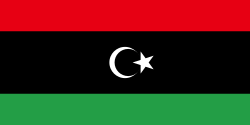 |
|---|
|
The 1969 Libyan Constitutional Proclamation (also translated as a Constitutional Declaration) was brought into force on December 11, 1969 by the Revolutionary Command Council, in the name of the Arab people of the Libyan Arab Republic. The proclamation would remain in force until the adoption of the interim constitution on August 3, 2011.